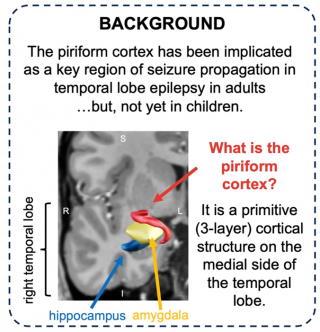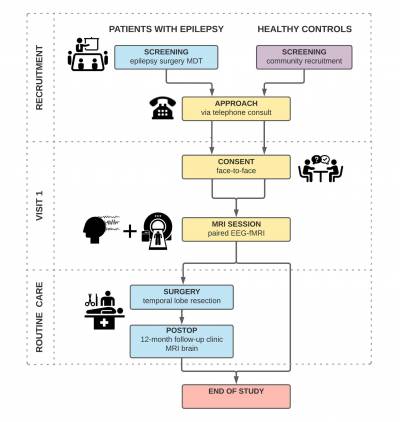About the 7-TLE study

- The 7-Tesla Temporal Lobe Epilepsy (7-TLE) Study is a prospective, case-control neuroimaging study of both children and adults with TLE being considered for epilepsy surgery.
- The 7-TLE Study utilises the ability of the high-field, 7-Tesla MRI scanner at St Thomas’ Hospital (find more details here) to obtain high-resolution data of small structures (such as the piriform cortex) in the temporal lobe.
- The 7-TLE Study will primarily investigate the connectivity of the piriform cortex and mesial temporal lobe structures by comparing functional MRI measures between patients with TLE and healthy participants.
Design

- Participants are invited to attend a single visit during which they will have a single 7-Tesla MRI scan.
- We are performing high-resolution functional and diffusion MRI to investigate the brain connectivity of temporal lobe structures.
- We are also developing the use of electroencephalography (EEG) to run simultaneously with fMRI acquisition
Objectives

Inclusion criteria for patients
Patients must have all of the following crietria for enrolment:
- Age 5 to 65 years at study enrolement
- Suspected to have focal TLE and referred to their respective epilepsy surgery multidisciplinary team (MDTs)
- Considered for epilepsy surgery
Inclusion criteria for healthy participants
Healthy participants must be:
• Aged between 5 – 65 years at study enrolment
Exclusion criteria for all participants
• Contraindications to MRI scanning
• Previous inability to intolerance to MRI scan without sedation or general anaesthetic
• Younger than 5 years or older than 65 years of age
Recruitment target
• 40 patients with temporal lobe epilepsy
• 30 healthy participants
Recruiting sites
• Guys’ and St Thomas’ Hospital
• Great Ormond Street Hospital
• The National Hospital for Neurology and Neurosurgery
Sponsor and oversight:
The 7-TLE Study is Sponsored by the UCL Great Ormond Street Institute of Child Health
 Close
Close


